Whether you are in academia or industry, one thing for sure is that you will have interviews. The stress here is in the plural form. You will have many interviews. While I have been an interviewer for machine learning engineer and data scientist roles in the past four years, I found myself as an applicant last year. It was a curious time for me. Some days I was an interviewer in the morning, and an applicant in the afternoon. Sitting at both sides of the table gave me a better perspective on technical interviews. I was also interested in what other people think. What are their perspectives from both sides? The PyData Amsterdam conference was a good opportunity to have some answers. This blog post outlines the unconference session I facilitated, sprinkled with my comments. All submissions were anonymous which could be found in its raw format at the bottom of this post. The submissions are from the audience of the live session.
The first thing I was curious about was the distribution in the room. My initial guess was that most people would be an applicant, and few would be an interviewer. My guess was off. A significant portion of attendees were both an applicant and an interviewer in the past two years.
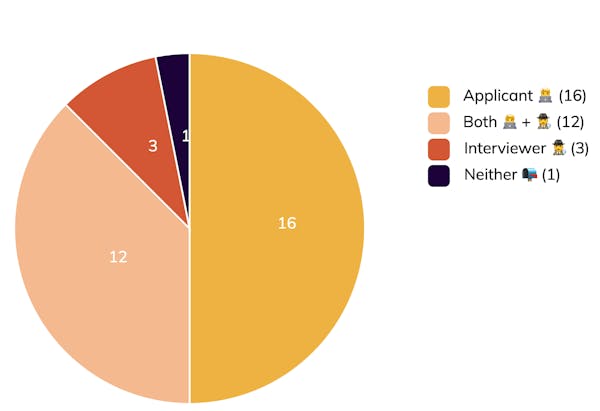
In the unconference session, we had two chapters. The first session was about the stories from and tips for the applicants. Orthogonally, the second part was about the stories from and tips for the interviewers. In each chapter I asked the audience to first share their stories or questions, followed by asking them to offer tips for the shared stories or questions submitted. Like in the unconference, we here too start from the applicant's point of view. I manually made clusters of the stories.
Applicant's Point of View
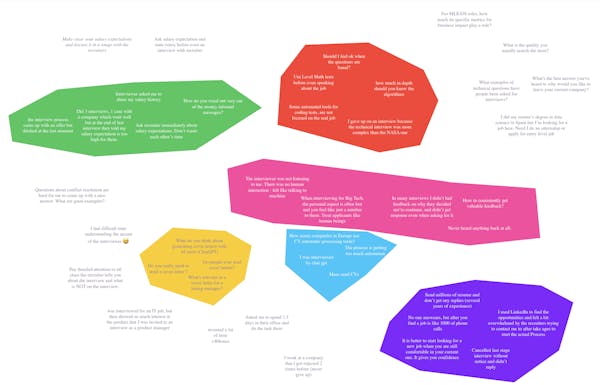
You can view the image above in pdf in here
The Salary
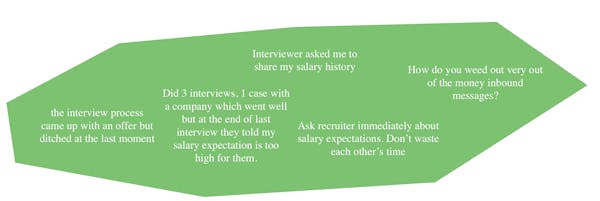
I can extract two stories from this cluster that we can work on. The first one is where the interviewer asked to disclose the salary history of the applicant. Foremost, you do not have to disclose your financial situation including your current or past salaries. It is sensitive information, but even more than that it is information that you won't want to share. If everything goes well, you will find yourself in compensation negotiation where this information will give a major upper hand to the company you are applying to. Recruiters or hiring managers may insist that you share that information. My personal advice for you would be that you insist even more not to share that information. I would not be afraid to "be seen as money-oriented".
The second story is about the salary expectation. The audience offered three tips for that:
* Make clear your salary expectations and discuss it in a range with the recruiters
* Ask salary expectation and state yours before even an interview with recruiter
* Clarify salary expectations asap. Make good market research about salary ranges
I agree! It is never too early to state your expectations and see if the company may be able to meet them.
Technical Questions
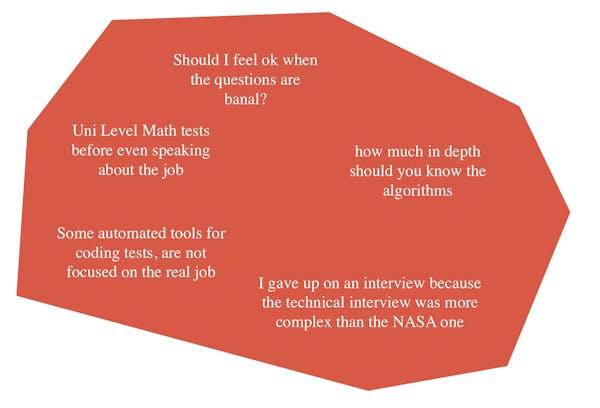 One pattern I see here is about the tests or questions that are irrelevant to the applied job. Unfortunately, some companies try to automate the candidate selection with inaccurate tests. Questions from the back of a textbook, algorithmic puzzles, you name it. If you think that it is not the right approach, I advise you not to take that interview. That is what I did personally.
One pattern I see here is about the tests or questions that are irrelevant to the applied job. Unfortunately, some companies try to automate the candidate selection with inaccurate tests. Questions from the back of a textbook, algorithmic puzzles, you name it. If you think that it is not the right approach, I advise you not to take that interview. That is what I did personally.
Other stories here are about complex or in-depth technical questions. We had some relevant tips from the audience about them:
* Don’t be afraid to say I don’t know, you are who you are and there is no way to change that during the interview
* Avoid giving wrong technical answers ! rather say what you 100% know and what you don't versus giving wrong technical information
* Have a lot of interviews for practice
Cover Letters
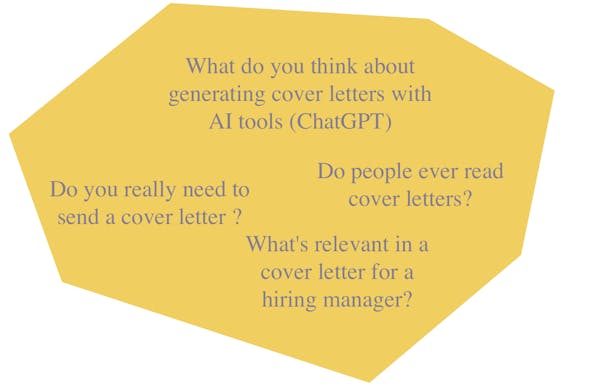
Are cover letters relevant? Do you need to write one? Here are some suggestions from the audience:
* Cover letters can make a difference between being genuine and custom vs mass-sent CVs
* Don’t repeat stuff from your CV in the cover letter, make it more personal
Frustrations
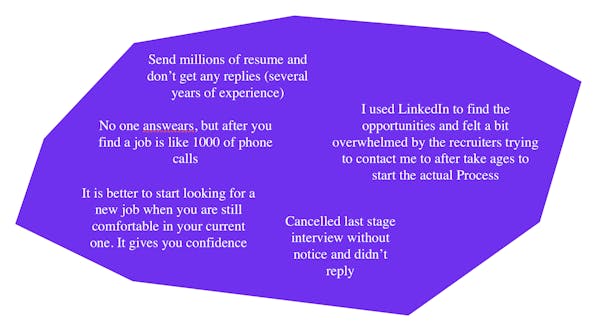
When you search LinkedIn Jobs, you find hundreds of job openings. Looking only at that, it seems like there is a large employee gap in the market for data scientists and machine learning engineers. However, most applicants find their applications ignored, auto-rejected, or ghosted after some interviews. We see that situation in this cluster. We had some good tips from the audience:
* Dont just list technical accomplishments, provide feedback on how those accomplishments benefited the company.
* Work your network to get someone to pull your resume out to be reviewed.
* Avoid recruiters with a "great fit" for your experience
* Apply to multiple places at the same time, even if multiple might hire you
* Have 2 CVs one for recruiters, and a detailed one for the hiring manager
Automated Processes
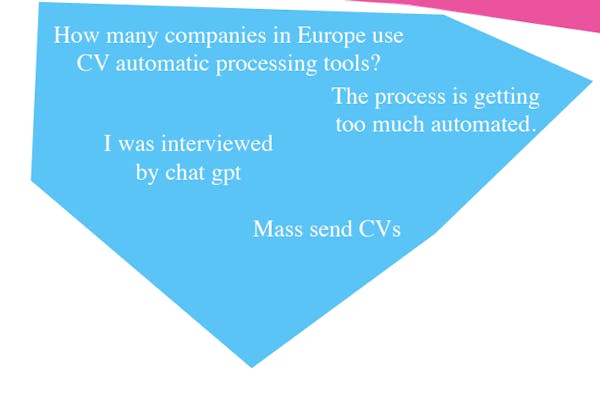
Unfortunately, we did not have any tips for these stories or questions. Personally, this was also a curve ball to me. I am especially surprised to see some unfortunate folks got interviewed by ChatGPT. I think similar advice applies from the "Technical Questions" section: if you think that is wrong, do not have the interview.
Interviewer's Point of View
It is not only the applicants who face troubles. Similarly, sometimes it is daunting to interview applicants too. In this section, we discuss the other face of the coin: stories and tips of interviewers.
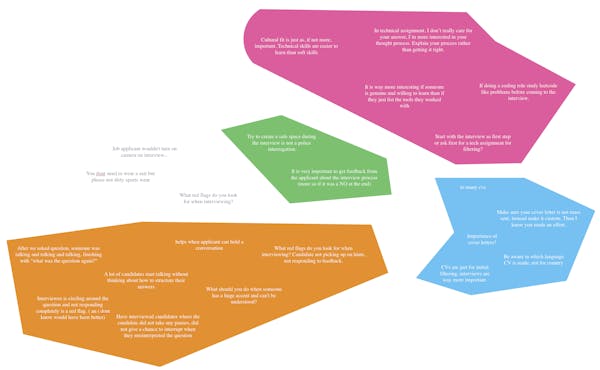
You can view image above in pdf in here
Communication Skills
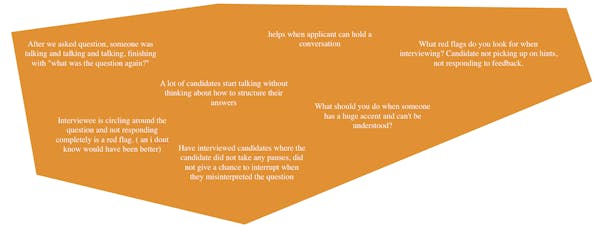
Many years ago someone I knew said that they studied computer science because they thought it would not require interactions with people. Needless to say, they quickly realized it was wrong. Communication is one of the most important skills to have. Looking at the portion of this cluster, the pain is shared among interviewers. Candidates who are failing to communicate their thought clearly and in a brew manner seems to be the main issue here. Let's see some tips from the audience about this. They seem to be directed more towards the applicant:
* Tell stories.
* Be precise and intentional with choice of words (especially technical ones)
* practice and refine your communication skills for interviews
* If interviewer asks you to take you time (eg 2min) to answer a question, for god sake, take it.
CVs and Cover Letters
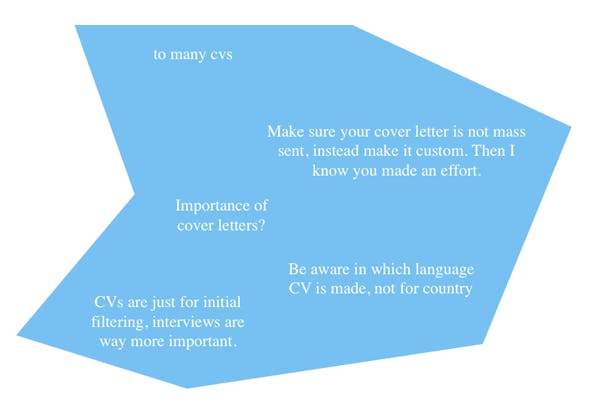 I will be honest. The importance of CVs and cover letters is still a mystery to me. Should CVs be long or short? Should they be in a certain format? Will having a good cover letter increase the chance of getting the first interview? When I am on the interviewer's side of the table, I simply read all the CVs and cover letters. Long or short, with a cover letter or not. Even a 5 page CV will take less than a minute to read. While I was curious about what others think about this, we did not receive any tips about these stories/questions. What do you think? Let me know via the channels listed at the bottom of this page!
I will be honest. The importance of CVs and cover letters is still a mystery to me. Should CVs be long or short? Should they be in a certain format? Will having a good cover letter increase the chance of getting the first interview? When I am on the interviewer's side of the table, I simply read all the CVs and cover letters. Long or short, with a cover letter or not. Even a 5 page CV will take less than a minute to read. While I was curious about what others think about this, we did not receive any tips about these stories/questions. What do you think? Let me know via the channels listed at the bottom of this page!
Interview Tips
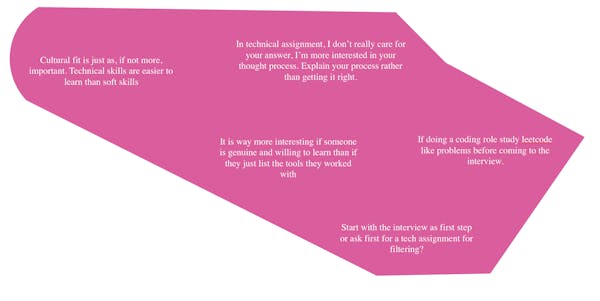 You have probably already realized at this point that the stories and tips mixed up a bit during the session. That is all good. In this section, the audience offered some tips that could be useful during the interviews! Here is more of that from the audience:
You have probably already realized at this point that the stories and tips mixed up a bit during the session. That is all good. In this section, the audience offered some tips that could be useful during the interviews! Here is more of that from the audience:
* Explain what trade offs you are making when designing or coding something.
* When you are asked for a tech stack if you dont know say I dont know if you say yes I will follow up and figure out you actually dont know but said yes
Responsibilities of Interviewers
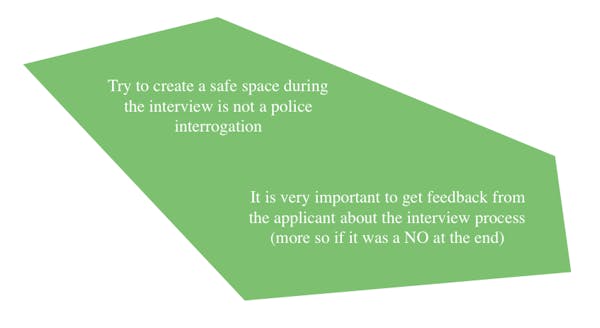 While we wait a lot from the applicants, what applicants expect from the interviewers? I believe there are some responsibilities of interviewers. Those include respecting applicant's time, having a safe and a comfortable space for the interviewer, and providing feedback if the response is negative. The list extends with more points from the audience:
While we wait a lot from the applicants, what applicants expect from the interviewers? I believe there are some responsibilities of interviewers. Those include respecting applicant's time, having a safe and a comfortable space for the interviewer, and providing feedback if the response is negative. The list extends with more points from the audience:
* If you ask to do an assignment that requires 8/16h of time, even if it's a really bad solution, PLEASE come back with a REAL feedback.
* the icebreaker at the beginning can be a very good opportunity to talk about things outside the position, the applicant is also a person
Closing Thoughts
The unconference was an interesting concept to collaborate with the conference attendees. While I still have doubts about the effectiveness of the unconference form, I believe we have gathered valuable insights and information from the community. From the applicant's side, the pain points were the salary discussions, processes that do not match with the role, getting ignored for their applications, and not receiving feedback. From the interviewer 'sside, the most pressing topic was the communication issues with the applicants. While the perfect interviewing process does not seem to be there in the near future, I hope we can learn from each other's views and tips. That said, I probably need to ask for feedback from the applicants I had interviews with recently...
You can access the raw data from here.


